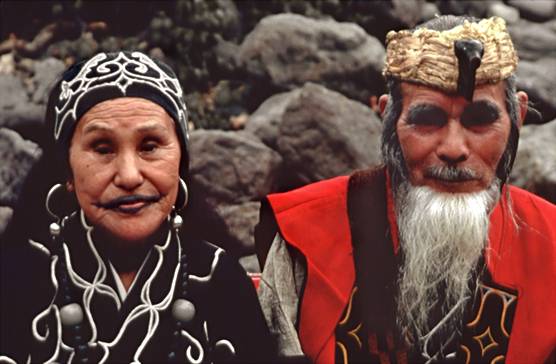Japan has one group of indigenous people called the Ainu. They populate the northern island of Japan, Hokkaido. Whilst their origins are still an object of debate, popular beliefs hold that they are of mixed European and Asian blood, thus their unique features of darker skin, larger built and more hairs on the body as compared to the Japanese.
A traditional Ainu couple. How charming.
Source: http://www.d.umn.edu/cla/faculty/troufs/anth1095/images/AinuCouple.jpg
Spiritual beliefs of the Ainu are relatively animistic, revolving around the environment and the belief that spirits and life energy exist in all objects, similar to the Japanese Shintoism. This results in the Ainu holding nature in great reverence. On an interesting note, the bear is revered as one of the sacred animals in Ainu beliefs, and is seen as an incarnation of the hero that taught the Ainu how to fish, hunt and weave.
This is also an explanation to their traditional way of life that revolves around hunting, fishing and agriculture as this allows them to keep in touch with nature.
However, spiritual beliefs are the only common factors the Japanese and Ainu have. The Ainu actually have a culture where males let their facial hairs grow as it is seen as a sign of beauty. Their female counterparts tattoo their lips with smut, to mimic beards. Both genders also spot earrings and jewelry as it is also a sign of beauty.
However, in more recent years, the Ainu are facing a certain potential of extinction due to the loss of roots. The Japanese society upholds group harmony and homogeneity to such an extent there is strong racism against foreigners and other races that are non-Japanese. Thus many of the Ainu of the previous generation hid their identities, rejecting and abandoning Ainu culture to hide the fact that they are Ainu so as to avoid being ostracized. Some of the younger generation are even unaware of their Ainu roots and identities due to the perfect facade that their parents have kept up, and thus believe themselves to be Japanese.
Whilst racism towards the Ainu has died down generally and is less visible in modern Japan, it is noted that there are still some who ostracize the Ainu.
Reference:
Schumer (2002) Ainu. Retrieved from http://www.mnsu.edu/emuseum/cultural/oldworld/asia/ainu.html
Thomason (1999) The Ainu of Japan: The History, Culture and Discrimination Against this Aboriginal Group. Retrieved from http://www.suite101.com/article.cfm/fourth_world/22057
Japan - Ainu. Retrieved on 8th December 2010, from http://www.japan-guide.com/e/e2244.html
Anitei (2008) 9 Amazing facts about the Ainu people. Retrieved from http://news.softpedia.com/news/9-Amazing-Things-About-the-Ainu-People-79277.shtml


No comments:
Post a Comment